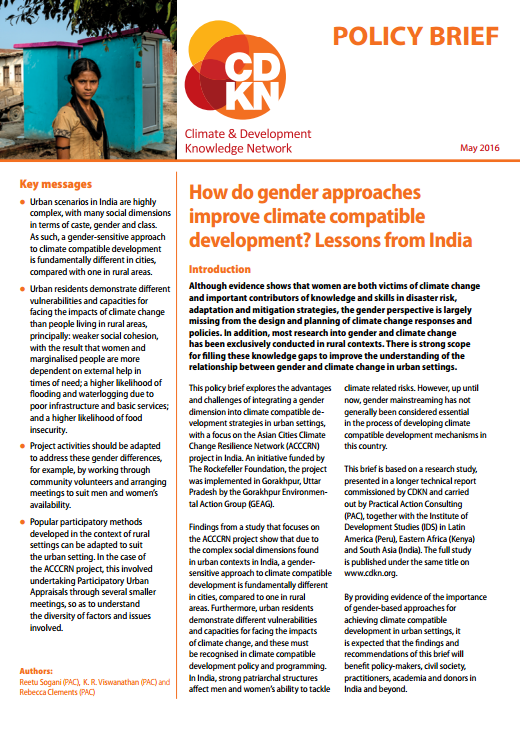Case-study /
Policy brief: How do gender approaches improve climate compatible development? Lessons from India

Introduction
Although evidence shows that women are both victims of climate change and important contributors of knowledge and skills in disaster risk, adaptation and mitigation strategies, the gender perspective is largely missing from the design and planning of climate change responses and policies. In addition, most research into gender and climate change has been exclusively conducted in rural contexts. There is strong scope for filling these knowledge gaps to improve the understanding of the relationship between gender and climate change in urban settings.
This policy brief*explores the advantages and challenges of integrating a gender dimension into climate compatible development strategies in urban settings, with a focus on the Asian Cities Climate Change Resilience Network (ACCCRN) project in India. An initiative funded by The Rockefeller Foundation, the project was implemented in Gorakhpur, Uttar Pradesh by the Gorakhpur Environmental Action Group (GEAG).
*download from the right-hand column or via the link under further resources
Key Messages
- Urban scenarios in India are highly complex, with many social dimensions in terms of caste, gender and class. As such, a gender-sensitive approach to climate compatible development is fundamentally different in cities, compared with one in rural areas.
- Urban residents demonstrate different vulnerabilities and capacities for facing the impacts of climate change than people living in rural areas, principally: weaker social cohesion, with the result that women and marginalised people are more dependent on external help in times of need; a higher likelihood of flooding and waterlogging due to poor infrastructure and basic services; and a higher likelihood of food insecurity.
- Project activities should be adapted to address these gender differences, for example, by working through community volunteers and arranging meetings to suit men and women’s availability.
- Popular participatory methods developed in the context of rural settings can be adapted to suit the urban setting. In the case of the ACCCRN project, this involved undertaking Participatory Urban Appraisals through several smaller meetings, so as to understand the diversity of factors and issues involved.
[See the full text for details of the recommendations made]
Authors: Reetu Sogani (PAC), K. R. Viswanathan (PAC) and Rebecca Clements (PAC)
About CDKN
The Climate and Development Knowledge Network (CDKN) aims to help decisionmakers in developing countries design and deliver climate compatible development. We do this by providing demand-led research and technical assistance, and channeling the best available knowledge on climate change and development to support policy processes at the country level.
About Practical Action Consulting
Practical Action Consulting (PAC) is the consulting arm of Practical Action, an international development agency working with poor communities in Africa, Asia and Latin America to help them choose and use technology to improve their lives.
Suggested Citation
Sogani, R., Viswanathan, K. R. and Clements, R. (2016) How do gender approaches improve climate compatible development? Lessons from India. CDKN Policy Brief. Climate & Development Knowledge Network: London, UK
- Read the full policy brief
- Policy brief: How do gender approaches contribute to climate compatible development? Lessons from Kenya
- Policy brief: How do gender approaches contribute to climate compatible development? Lessons from Peru
- 10 things to know: Gender equality and achieving climate goals
- Gender approaches in climate compatible development: Lessons from urban India
- Read the online book: Mainstreaming climate compatible development
